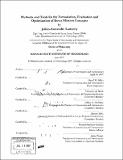Methods and tools for the formulation, evaluation and optimization of rover mission concepts
Author(s)
Lamamy, Julien-Alexandre, 1978-
DownloadFull printable version (24.30Mb)
Other Contributors
Massachusetts Institute of Technology. Dept. of Aeronautics and Astronautics.
Advisor
David W. Miller.
Terms of use
Metadata
Show full item recordAbstract
Traditionally, Mars rover missions have been conceived with a single point design approach, exploring a limited architectural trade space. The design of future missions must resolve a conflict between increasingly ambitious scientific objectives and strict technical and programmatic constraints. Therefore, there is a need for advanced mission study engineers to consider a wider range of surface exploration concepts in order to identify those with superior performance and robustness with respect to evolving mission objectives. To this end, a three stage trade space exploration approach has been developed to supplement point design development in the early conceptual phase of Mars rover missions. The product is an integrated set of theoretical methods and analytical tools which enhances the understanding and enables the rapid exploration of the rover mission trade space. In the formulation stage, the first stage of the approach, a parallel decomposition of the functional and physical aspects of Mars exploration architectures is employed to explore trade space of surface mission concepts. At each step of the decomposition, architectural alternatives are assessed with respect to stakeholder figures of merit. (cont.) The resulting concept development trees allow for a rapid assessment of a given design's strength and robustness with respect to stakeholder priorities. In the evaluation stage, the Mars Surface Exploration (MSE) rover system design tool is used to support quantitative analysis of the superior designs identified in the formulation stage. This tool, for advanced mission studies, offers unique functionality: breadth of exploration, system-level modeling fidelity and rapidity. As a demonstration of its capabilities, the tool is used to model and evaluate a multi-rover mission concept in less than two hours. In the optimization stage, two systems engineering methods are developed to optimize, with MSE, the more complex technical and physical aspects of rover mission architectures. The first method assesses the value of autonomy technologies in future missions; it is based on the principle that the monetary worth of autonomy can be evaluated by benchmarking its performance against competing solutions with known cost. The method is applied to value autonomy development for site-to-site traverse and sample approach activities. (cont.) The second method optimizes platform strategies for space exploration systems; an innovative optimization technique is developed to enumerate of all platform options. In the six rover mission campaigns analyzed, the best platform strategies are shown to generate very limited savings compared to traditional strategies. The two case studies demonstrate that the analytical capabilities of MSE combined with a theoretical structure form a valuable decision making tool for early conceptual design trade-offs.
Description
Thesis (Ph. D.)--Massachusetts Institute of Technology, Dept. of Aeronautics and Astronautics, 2007. Page 256 blank. Includes bibliographical references (p. 245-255).
Date issued
2007Department
Massachusetts Institute of Technology. Department of Aeronautics and AstronauticsPublisher
Massachusetts Institute of Technology
Keywords
Aeronautics and Astronautics.